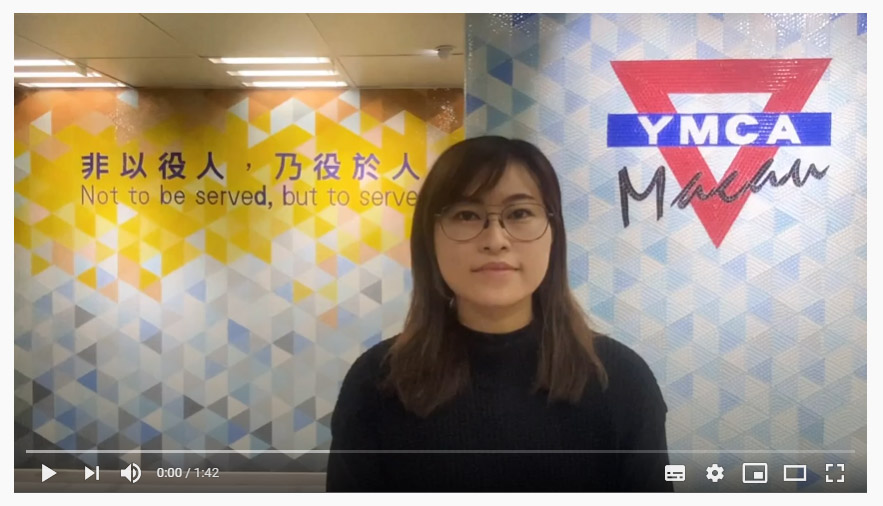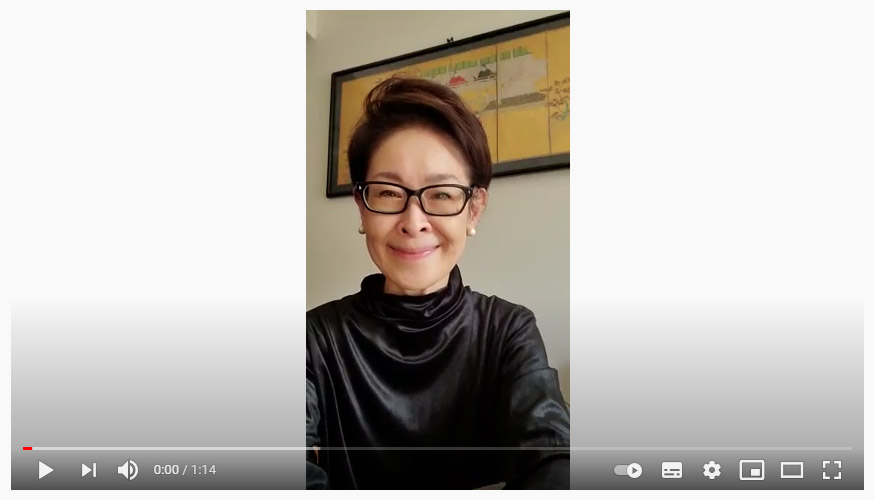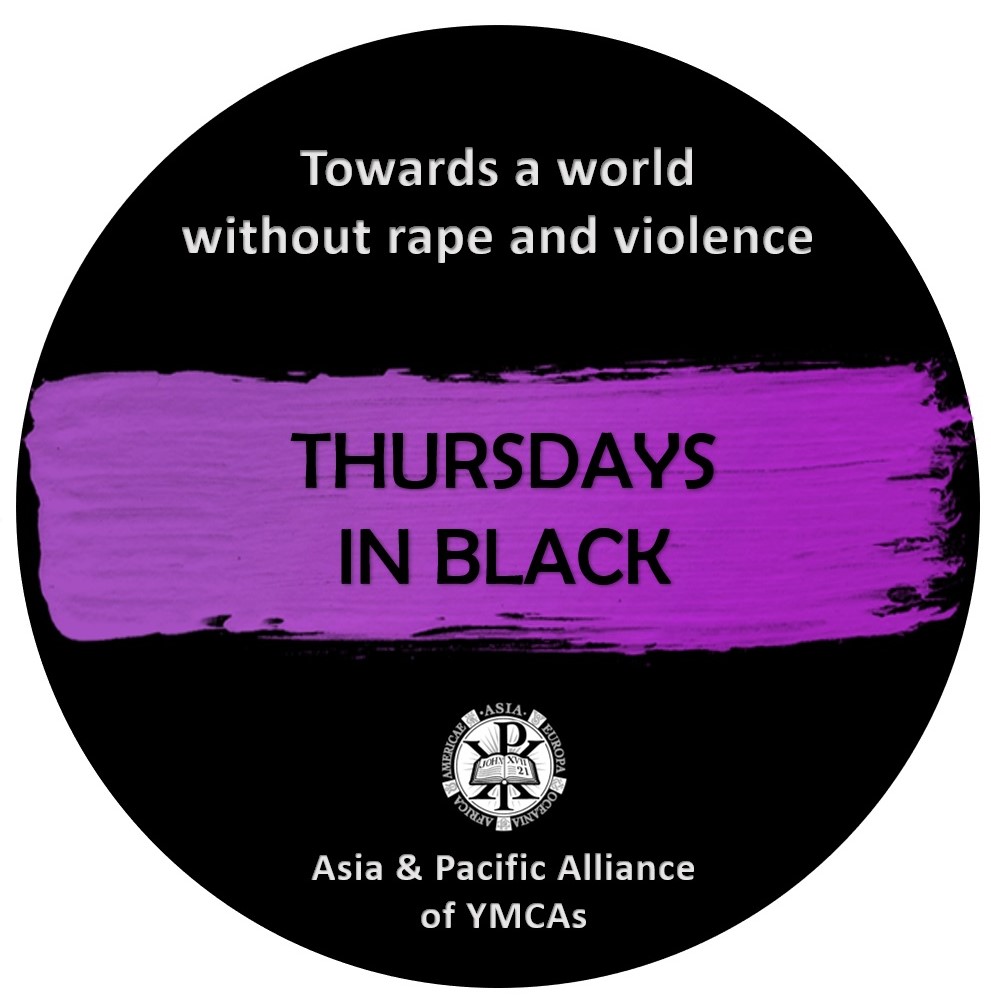Gender Justice
YMCA is a world-wide Christian, ecumenical, voluntary movement for women and men with special emphasis on the genuine involvement of young people. It seeks to share the Christian ideal of building a human community of justice with love, peace and reconciliation for the fullness of life for all creation.
Each member YMCA is therefore called to focus on certain challenges which will be prioritised according to its own contexts- that includes:
• Empowering all, especially young people and women to take increased responsibilities and assume leadership at all levels and working towards an equitable society.
• Advocating for and promoting the rights of women and upholding the rights of children
(Excerpts from Challenge 21)
The APAY adheres to the guiding principle of Challenge 21; hence commitment for the Gender Justice remains an integral part and a mandate in the YMCA, especially in the Asia and Pacific region. APAY initiates the promotion of Gender Equity in all levels with a community-specific approach. It affirms that the quest for the elimination of discrimination of gender-based violence and promotion of an inclusive society requires a collaborative undertaking irrespective of sex and gender. The YMCAs will continue to establish an inclusive environment by creating awareness and policies that promote and reflect gender justice and develop a mechanism that addresses gender issues, including sexual harassment. Through the Gender Justice initiatives, APAY increases dialogue and discussions on various perspectives, including the non-binary perspectives of gender.
Gender Justice is one of the main focus of the Quadrennial Program Plan (QPP) of the APAY with the following objectives:
- To cultivate a culture of gender equity and empowerment of women and girls at all levels through the creation of platforms of learning, reflection and exchanges of experiences
- To ensure the development of leadership skills, organizing and advocacy capacities of YMCA constituencies that promote reforms for equal opportunities for all at all levels
YMCA is a world-wide Christian, ecumenical, voluntary movement for women and men with special emphasis on the genuine involvement of young people. It seeks to share the Christian ideal of building a human community of justice with love, peace and reconciliation for the fullness of life for all creation.
Each member YMCA is therefore called to focus on certain challenges which will be prioritised according to its own contexts- that includes:
• Empowering all, especially young people and women to take increased responsibilities and assume leadership at all levels and working towards an equitable society.
• Advocating for and promoting the rights of women and upholding the rights of children
(Excerpts from Challenge 21)
The APAY adheres to the guiding principle of Challenge 21; hence commitment for the Gender Justice remains an integral part and a mandate in the YMCA, especially in the Asia and Pacific region. APAY initiates the promotion of Gender Equity in all levels with a community-specific approach. It affirms that the quest for the elimination of discrimination of gender-based violence and promotion of an inclusive society requires a collaborative undertaking irrespective of sex and gender. The YMCAs will continue to establish an inclusive environment by creating awareness and policies that promote and reflect gender justice and develop a mechanism that addresses gender issues, including sexual harassment. Through the Gender Justice initiatives, APAY increases dialogue and discussions on various perspectives, including the non-binary perspectives of gender.
Gender Justice is one of the main focus of the Quadrennial Program Plan (QPP) of the APAY with the following objectives:
1 To cultivate a culture of gender equity and empowerment of women and girls at all levels through the creation of platforms of learning, reflection and exchanges of experiences
2 To ensure the development of leadership skills, organizing and advocacy capacities of YMCA constituencies that promote reforms for equal opportunities for all at all levels
REGIONAL SYMPOSIUM ON INTERNATIONAL WOMEN’S DAY
Last Updated (Wednesday, 03 March 2021 11:33)
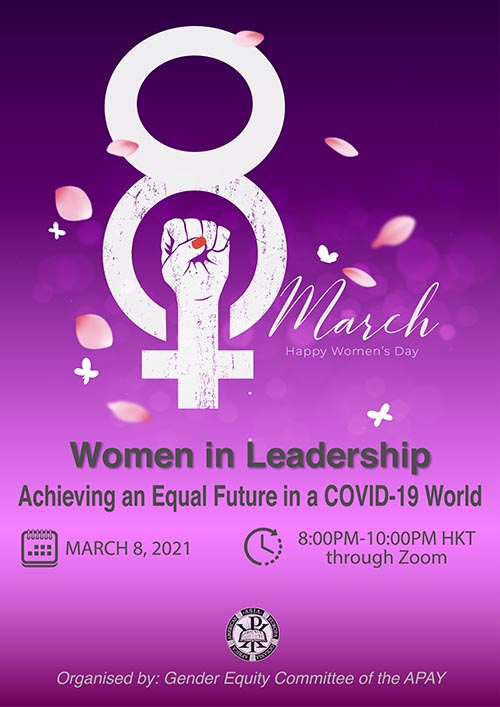
March 8, 2021 at 8:00PMHK
A regional Symposium is planned to celebrate International Women’s Day (IWD) on 8th March. “Women in leadership: Achieving an equal future in a COVID-19 world” is the theme that celebrates women and girls' tremendous efforts worldwide in shaping an equal future and recovery from the COVID-19 pandemic. Ms. Patricia Pelton, president of the World YMCA, Dr Aruna Gnanadasan, national convener of the Indian Christian Women’s Movement and former global programme director on Women in Church and Society and the Justice, Peace and Creation of the World Council of Churches are among the speakers. The symposium brings insight into women leadership in the Asia Pacific, the YMCA, and the Church. The GEC invites you to join the Symposium in solidarity with women and celebrate the IWD together. Interested members can register to join the symposium. Please click the link to register by March 7, 2021
https://us02web.zoom.us/meeting/register/tZMkfumgqD8qHtxN1ioxzlDimVorelkTRoCw
Participation at the UN Commission on the Status of Women 65
NGO Side event Workshop
Towards a Safe, Just and Inclusive World: Women’s Participation in Decision Making
March 25, 2021
Every year, representatives of Member States gather at United Nations Headquarters in New York for the Commission on Status of Women. CSW evaluates the progress of gender equality, identify challenges, set global standards and formulate concrete policies to promote gender equality and advancement of women worldwide. The CSW is the principal international intergovernmental body exclusively dedicated to promoting gender equality and women's empowerment. A functional commission of the Economic and Social Council (ECOSOC) was established by ECOSOC resolution 11(II) of 21 June 1946.
World YMCA, as an accredited organization to the Economic and Social Council (ECOSOC) of the United Nations, an international delegation will attend this year's virtual session of the Commission on the Status of Women (CSW65), which will take place between 15-26 March 2021. Usually, this is an event that takes place in New York, but this year it will, of course, be virtual due to the COVID-19 pandemic. Twelve members of the gender equity committee have registered to attend the virtual workshops. APAY also has registered to hold an NGO side event during the UN CSW on March 25 on the theme Towards a Safe, Just and Inclusive World: Women’s Participation in Decision Making. More information on registration will be shared in the coming days.
Together We Stand against Sexual and Gender-Based Violence
Last Updated (Thursday, 28 January 2021 16:58)
Together We Stand against Sexual and Gender-Based Violence
The National Council of YMCAs of India organized a Week-long of Activism Against
Gender-Based Violence

In response to the call of the Asia & Pacific Alliance of YMCAs( APAY), to observe the 16 Days of Activism against Gender-Based Violence (GBV), the NCY India organized a week long virtual program on December 4-10, 2020. The global campaign began on November 25, 2020, the International Day for the Elimination of Violence against Women, and concluded on 10th December 2020, the Human Rights Day. The UN UNiTE campaign had set the theme for the year “Orange the World: Fund, Respond, Prevent, Collect!" The APAY chose the theme “Together We Stand Against Sexual and Gender-Based Violence”, and invited men and women to actively participate in the 16 days of the campaign.
The NCY India actively participated in the global campaign. The week long meaningful virtual program was a collective effort of the National Women’s Forum, The Department of National Youth Work & Programmes of the National Council of YMCAs of India (NCYI) in association with different Projects & Region of the NCYI - The Southern India Region of YMCAs, Health & Healthy Living Project, Vellore, YMCA Youth Centre Project Bhimtal, YMCA Multi-Sports Complex project, Faridabad, YMCA Programme Centre, Kurnool and National Projects in South West India Region, Alwaye Campsite Project, hosted the week long program.
The virtual program was designed with specific themes for each day to address issues related to sexual, gender-based violence, specifically violence against women. The Inaugural day programme hosted by the Youth Work Department of NCY India on the 4th December led by Mr. Sam Robert, (Secretary of National Youth Work & Programme Department) and inaugurated by the chief-guest honourable Justice (Retd.) Jacob Benjamin Koshy, (National President of NCYI). The order of worship was led by Mrs Elizabeth George, (General Convener, Dr Leonora R. Mohan, &Ms Asha Paul, Vice-Chairpersons of the National Women’s Forum, NCYI, Dr Betsy Williams, National Executive Member, NCYI, Mrs Rosleen Devaraj, Chairperson, Women’s Forum, South Central India Region of YMCAs, Ms Riya Raj Dubey, Youth Leader, Faridabad Project, Ms Janet Vasantha Kumari, Chairperson, Women’s Empowerment & Gender Concern, Madurai YMCA, Dr Lalthankima Ralte, Chairperson, Women’s Forum, North East India Region of YMCAs &Ms Jayashree Pradhan, Chairperson, Women’s Forum, Eastern India Region of YMCAs.
Mr. Nam Boo Won, General Secretary of APAY, gave the guest of honour message, which stressed on the significance of growing leadership of women together with men. He congratulated the NCY India for a meaningful programme with great response. Mr. Bertram Devadas, National General Secretary of NCY India delivered the special address. The keynote speaker Dr. Ruth Manorama, President, National Alliance of Women, & Dalit Social Activist focused on the theme “Together We Stand Against Sexual and Gender-Based Violence.” She quoted various points in a practical way and asked the YMCA movement must extend theire projects especially on this particular issue at all over the word.
Read more: Together We Stand against Sexual and Gender-Based Violence
APAY invites the members of YMCAs to participate in the 16 Days of Activism against Gender-Based Violence
Last Updated (Wednesday, 27 January 2021 23:42)
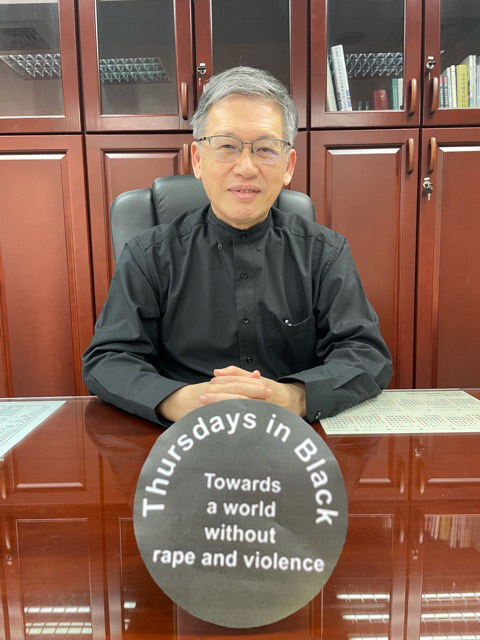
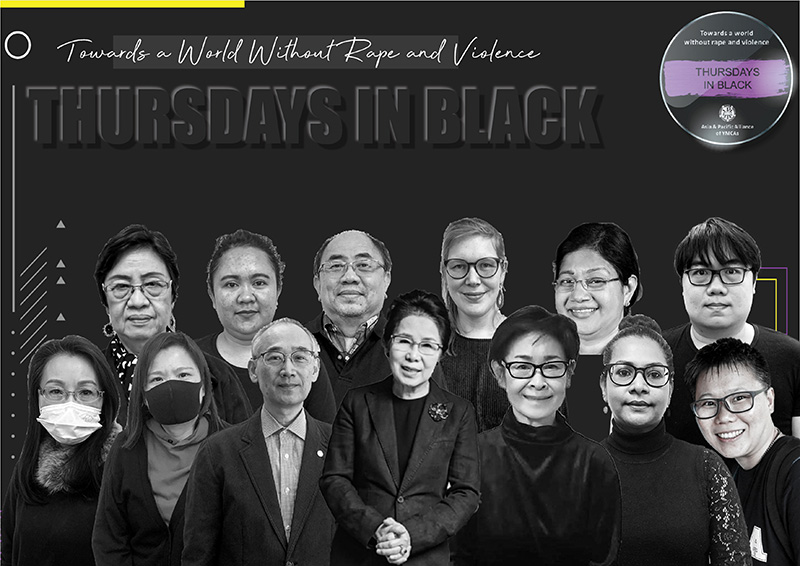
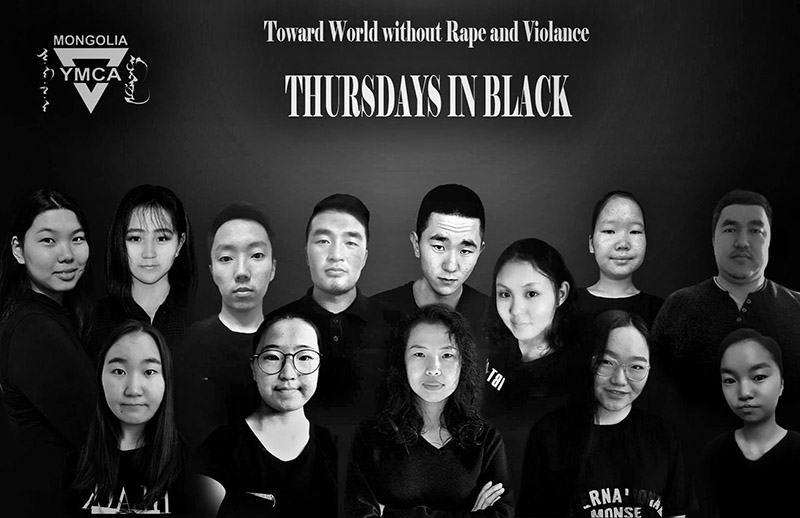
The Gender Equity Committee (GEC) meeting was held virtually on November 25, at 4 PM HKT, attended by nine members, including the General Secretary of APAY. The meeting was presided by the newly elected chairperson Dr. Meerha Hahn.
It was planned to hold the meeting on the 25th of November to symbolically launch the 16 days of activism against gender-based violence, which starts on November 25 and runs until December 10, International Human Rights Day. The meeting started with opening worship based on gender justice on the theme Together We Stand against Sexual and Gender-Based Violence. A reflection was shared by the chairperson on the bible text Galatians 3:28.
GEC members discussed the Quadrennial Program Plan (QPP) on gender justice and the proposed programs/ activities to implement under the gender justice programs in 2020-2021. The proposed programs of 2021 are face to face programs, and that might be difficult to implement due to the continuous concerns on COVID19 pandemic. Therefore, the members discussed how to convert the face to face programs to virtual programs/ workshops/webinars? The GEC members will meet again on December 8 to continue to discuss and decide on the virtual programs for 2021.
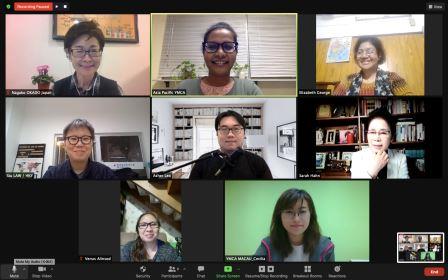 |
| ↑ Gender Equity Commttee members during the virtual meeting |
16 Days of Activism Against Gender – Based Violence November 25 – December 10
Last Updated (Thursday, 26 November 2020 11:20)
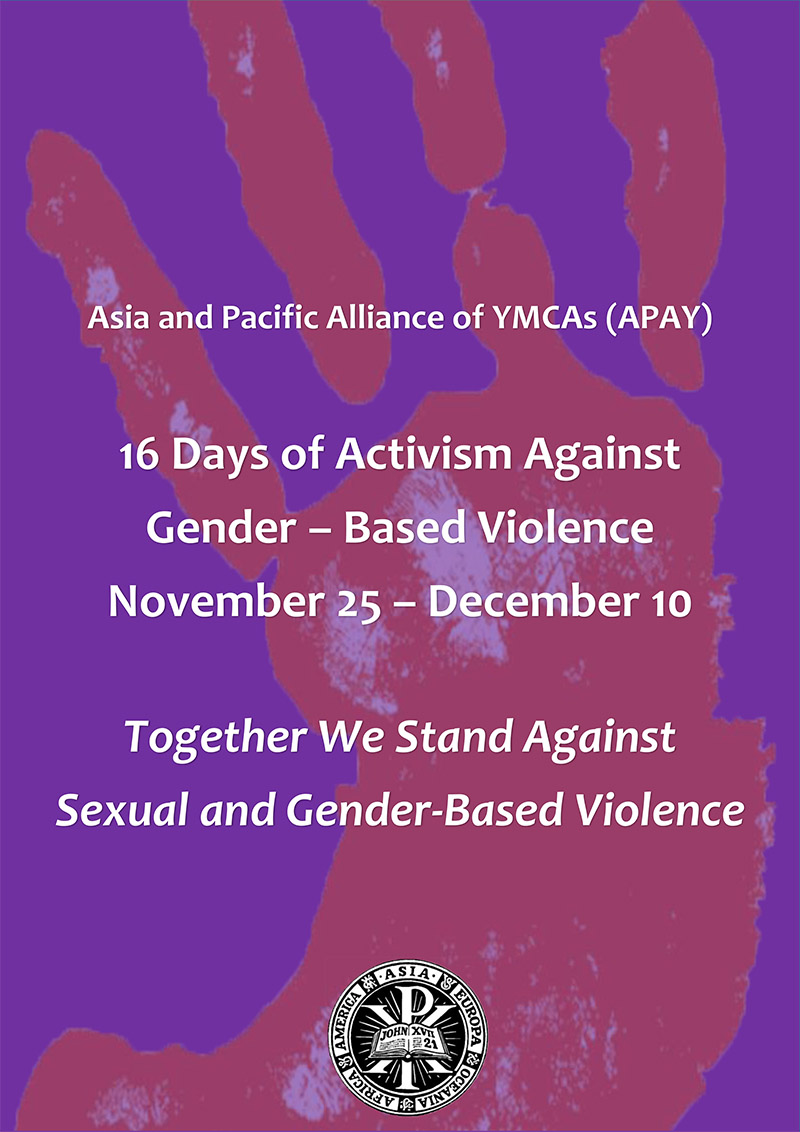
Read more: 16 Days of Activism Against Gender – Based Violence November 25 – December 10
APAY Gender Equity Committee (GEC) Meeting held via Zoom
Last Updated (Wednesday, 18 November 2020 15:54)
APAY Gender Equity Committee (GEC) Meeting held via Zoom
- Dr. Meerha Hahn elected as Chair –
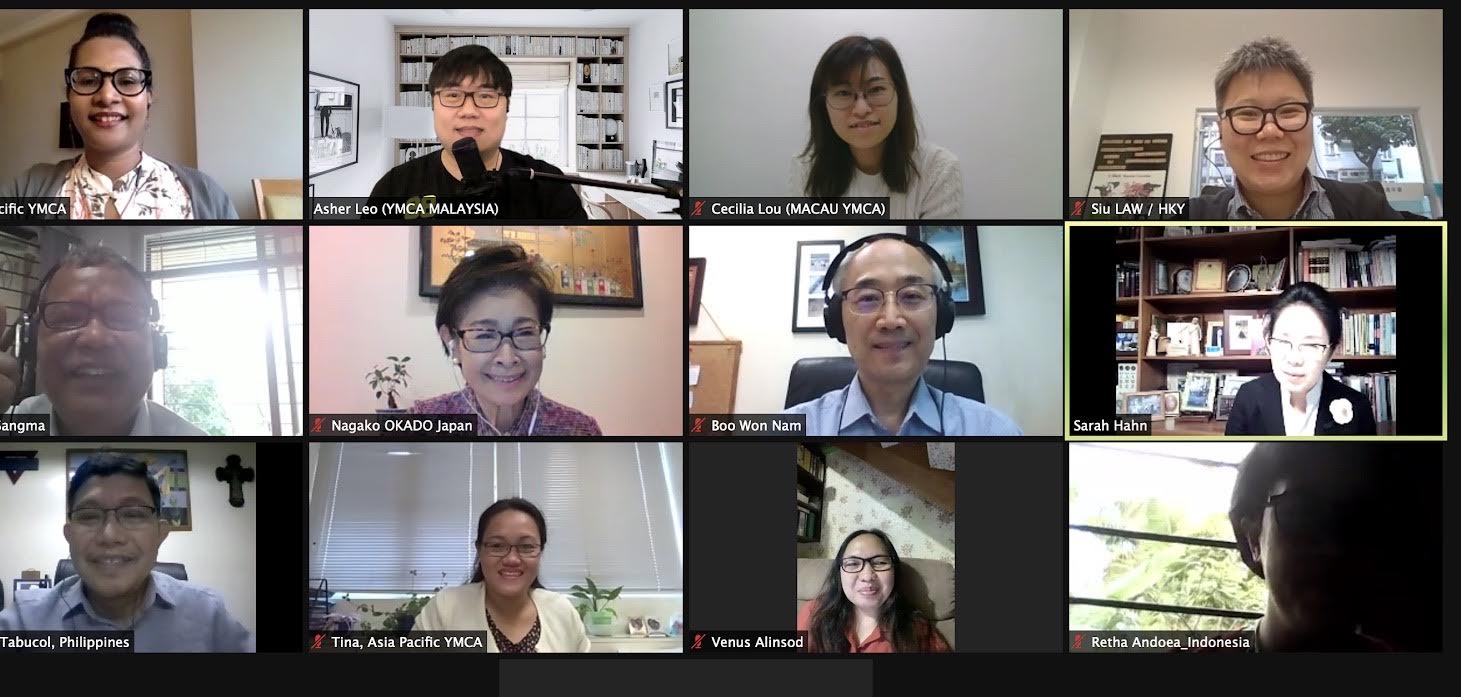
The GE Committee meeting was held virtually on November 4, at 3 PM HKT. The members, including invitees and APAY staff, attended the meeting.
The main agenda of the meeting was to elect the new Chairperson for the GEC, for the current quadrennium (2020-2023), and discuss the upcoming gender justice programs and activities.
The election of the Chair was postponed due to the COVID19 pandemic and the possibility of a face to face meeting is grim in the present situation, that led us to organize this virtual meeting. We are happy to inform that the members elected Dr Meerha Hahn as the new chairperson of the GEC for the next quadrennium to lead the GEC and advance the work of the gender justice programs in the Asia and Pacific region through the APAY.
The members are thankful to Ms Nagako Okado, the former Chairperson, for her excellent work with passion and commitment towards gender justice for the past four years. The members appreciated Ms Cristina Miranda, who was the staff in charge of the gender justice program for her hard works to implement all the proposed programs and recommendations of the GEC in the Asia and Pacific region.
The members also discussed the immediate upcoming gender justice programs and planned to meet again to develop the gender justice program strategy for the next quadrennium.
Read more: APAY Gender Equity Committee (GEC) Meeting held via Zoom
Read more...
Page 5 of 8






